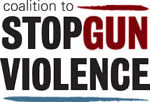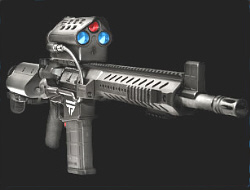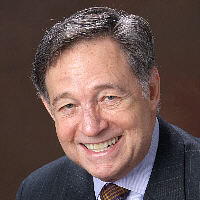

Anti-gun Group Wants to Ban Rifles
"Too Accurate" for Civilians
![]()
By Kurt Hofmann, September 17th, 2014
JPFO writer contributor, © 2014.
![]() Austin, TX-based TrackingPoint's "precision guided rifles," using sophisticated optics and electronics to supposedly enable incredibly accurate shooting over very long ranges, even against moving targets, and by shooters of modest skill, have drawn some criticism from "gun control" advocates who believe that private citizens must not be permitted access to firearms that are "too capable."
Austin, TX-based TrackingPoint's "precision guided rifles," using sophisticated optics and electronics to supposedly enable incredibly accurate shooting over very long ranges, even against moving targets, and by shooters of modest skill, have drawn some criticism from "gun control" advocates who believe that private citizens must not be permitted access to firearms that are "too capable."
An Oregon Herald article quotes David Chipman, of Mayors Against Illegal Guns, making the case for the "danger" posed by these rifles:
David Chipman, a spokesman for Mayors Against Illegal Guns which lobbies for an expansion of background checks for people buying guns, said the PGF "is not your grandfather's hunting rifle used for sport and recreation this is a weapon designed to kill with precision.
Well, true, I suppose--my grandfather would have been flabbergasted at the idea of a $25,000 hunting rifle, but is any hunting rifle not "designed to kill with precision"? An ethical hunter, after all, strives for a clean kill, and a clean kill is of necessity a precise one.
Chipman is not finished, though:
"This technology potentially enables any two bit criminal to operate with the skills of a highly trained sniper," Chipman said.
A "two bit criminal" with a $25,000 rifle (or an economical $9,500 if he opts for the less accurate, semi-automatic version)? Two bits must buy rather a lot more than I'd thought these days.
 Josh Horwitz, executive director of the Coalition to Stop Gun Violence, describes the technology as proof that the gun industry is sacrificing public safety for profit, as quoted in the same Oregon Herald article:
Josh Horwitz, executive director of the Coalition to Stop Gun Violence, describes the technology as proof that the gun industry is sacrificing public safety for profit, as quoted in the same Oregon Herald article:
"This is an industry hell bent on making weapons more lethal and taking no measures to extend safety," Horwitz said. "If this type of technology is transferred into semi automatic and automatic weapons, it would make it even more lethal."
 Since then, TrackingPoint has introduced semi-automatic, AR-15 based "precision guided firearms" (how Horwitz expects this technology--which imposes electronic control even over the firing mechanism, to not allow the gun to fire even when the trigger is pulled, until the computer judges the shot to be perfectly lined up--to translate to fully-automatic firearms, is left unexplained).
Since then, TrackingPoint has introduced semi-automatic, AR-15 based "precision guided firearms" (how Horwitz expects this technology--which imposes electronic control even over the firing mechanism, to not allow the gun to fire even when the trigger is pulled, until the computer judges the shot to be perfectly lined up--to translate to fully-automatic firearms, is left unexplained).
But even CSGV, with their unceasing call for a "government monopoly on force," cannot match the National Gun Victims Action Council (NGVAC) for overwrought, fear mongering rhetoric. Again, in the same Oregon Herald quoted earlier, NGVAC CEO Elliot Fineman argued that private citizens must be limited by law to firearm technology that makes them miss at least 70% of the time:
… this product gives shooters a better accuracy than, on average, most cops," Fineman said. He said the target accuracy of most police is three out of ten.
![]()
"To think that private citizens that are not trained could shoot better than 3 out of 10, it's scary," Fineman said.

Elliot Fineman
Forget for now about wondering about the source of Fineman's "three out of ten" stat (or the fact that if true, that probably includes officers' accuracy in chaotic handgun fights, rather than focusing exclusively on police sharpshooters' rifle marksmanship, which would be a much closer analog to what a private citizen would be trying to do with a TrackingPoint rifle). Concentrate instead on the fact that Fineman contends that public safety requires that private citizens be just as incompetent with firearms as the average police officer. For a private citizen to hit as often as he misses is "scary."
Recently, NGVAC has stepped up its campaign to ban TrackingPoint rifles for private citizens:
NGVAC and its partners, the Newtown Victims & Clergy for Corporate Responsibility, Faiths United To Prevent Gun Violence, PICO National Network, United Physicians of Newtown, Newtown Action Alliance and 100,000 Poets for Change have called for a ban of the weapons which have no valid use in shooting sports or self-defense and are ready-made for insurrectionists, terrorists and hate groups.
In a letter to Lee Williams, "The Gun Writer" for the Sarasota Herald Tribune, Fineman even invented a strange new, secret function of the Second Amendment:
Nor did the gun advocates who wrote us address our side's Second Amendment right to regulate guns.
 Now, suddenly, the right to infringe on the right that shall not be infringed . . . shall not be infringed--my head hurts.
Now, suddenly, the right to infringe on the right that shall not be infringed . . . shall not be infringed--my head hurts.
Remember, again, what the supposed objection to these rifles is--that they are "too accurate." But wait a second--I thought the reason so-called "assault weapons" are inappropriate for any "legitimate" use by private citizens is that they're not accurate enough:
[Bernard Sullivan, of the Sandy Hook Advisory Committee, former state Department of Public Safety commissioner, and former Hartford, CT police chief] said assault weapons are less accurate, making then inappropriate for hunting or for defending a home.
So in other words, evidently, there's only a narrow range of accuracy that is acceptable for private citizens. Anything else is either too inaccurate for safe use by citizens (but police and the military don't need accuracy, apparently), or too accurate for use by we the people.
 Of course, anyone with any knowledge of guns is aware that accuracy is far less a function of the gun and accessories than of the training and skill of the shooter. How long will it be, one must wonder, before the legality of our access to training is challenged? Actually, the Violence Policy Center seems already to have done so (bold emphasis added):
Of course, anyone with any knowledge of guns is aware that accuracy is far less a function of the gun and accessories than of the training and skill of the shooter. How long will it be, one must wonder, before the legality of our access to training is challenged? Actually, the Violence Policy Center seems already to have done so (bold emphasis added):
The sniper culture in America is fueled by a deadly dance of profit among the gun industry, private sniper schools that teach civilians the deadly skills of sniping, and those who write and market instructional books and videos about sniping and who sell all of the "after market" paraphernalia that sniper's use.
![]()
It is well past time for condemnation of the sniper subculture by our national political leadership, investigation of gun industry marketing practices by Congress and regulatory agencies, and legislation regulating this deadly trade at the state, local, and federal levels.
If gun bans can be justified based on the fact that some are not accurate enough, and some are "too accurate," what gun is safe from a ban?
Was this information useful to you? If so, please consider donating, becoming a member or renewing your membership, or buying a DVD, book, tee-shirt, or other gear at our JPFO store.
 A former paratrooper, Kurt Hofmann was paralyzed in a car accident in 2002. The helplessness inherent to confinement to a wheelchair prompted him to explore armed self-defense, only to discover that Illinois denies that right, inspiring him to become active in gun rights advocacy. He also writes the St. Louis Gun Rights Examiner column. Kurt Hofmann Archive.
A former paratrooper, Kurt Hofmann was paralyzed in a car accident in 2002. The helplessness inherent to confinement to a wheelchair prompted him to explore armed self-defense, only to discover that Illinois denies that right, inspiring him to become active in gun rights advocacy. He also writes the St. Louis Gun Rights Examiner column. Kurt Hofmann Archive.
![]()




































